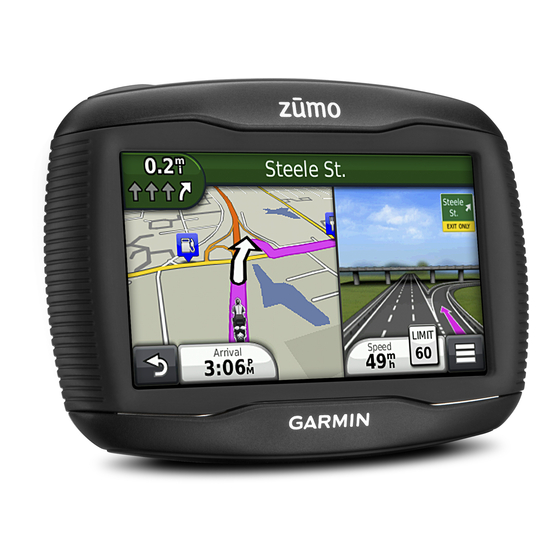- ページ 12
GPS Garmin zumo 350LMのPDF オーナーズマニュアルをオンラインで閲覧またはダウンロードできます。Garmin zumo 350LM 24 ページ。 Declaration of conformity
Garmin zumo 350LM にも: 重要な安全性と製品情報 (40 ページ), (仏)適合宣言書 (5 ページ)

• To delete one custom avoidance, select the avoidance,
and select
> Delete.
Enabling Advanced Detours
Select Settings > Navigation > Advanced Detours.
Taking a Detour Around Specified Areas
You can take a detour for a specified distance along your route
or detour around specific roads. This is useful if you encounter
construction zones, closed roads, or poor road conditions.
1
Select a destination, and select Go!
2
From the map, select
3
Select Next 0.5mi on Route, Next 2mi on Route, Next 5mi
on Route, or Detour by Road(s) on Route.
4
If necessary, select a road to detour around.
Navigating Off Road
If you are not following roadways as you navigate, you can use
Off Road mode.
1
Select Settings > Navigation.
2
Select Calculation Mode > Off Road > Save.
The next route will be calculated as a straight line to the
location.
Enabling Fuel Tracking
When you enable fuel tracking, a fuel gauge appears on the trip
computer
(page
9).
NOTE: Before you can enable fuel tracking, the device must be
in the motorcycle or automobile mount.
1
Fill your fuel tank.
2
Select an option:
• If you are enabling fuel tracking for the first time, select
Fuel Settings > Fuel Tracking > Distance Per Tank,
and enter the distance the vehicle travels per tank.
• If you have already enabled fuel tracking, select Reset
Fuel Tank for accurate fuel tracking.
Setting a Low Fuel Warning
You can set the device to warn you when the tank is low on fuel.
NOTE: The device must be connected to the motorcycle or
automotive mount to give low fuel warnings.
1
Enable fuel tracking
(page
2
Select Fuel Tank Warning.
3
Enter a distance, and select Done.
When you have only enough fuel left to travel the distance you
entered, a low fuel warning appears on the map page.
Map Pages
Customizing the Map
Customizing the Map Layers
You can customize which data appear on the map, such as
icons for points of interest and road conditions.
1
From the map, select
2
Select Map Layers.
3
Select which layers you want to include on the map, and
select Save.
Viewing the Trip Log
Your device keeps a trip log, which is a record of the path you
have traveled.
1
Select Settings > Map & Vehicle > Map Layers.
8
(page
4).
> Detour.
8).
.
2
Select the Trip Log check box.
Changing the Map Data Field
1
From the map, select the data field in the lower left-hand
corner.
2
Select a type of data to display.
3
Select Save.
Customizing Map Buttons
You can include up to two icons on the right side of the main
map.
1
Select Settings > Map & Vehicle > Map Buttons.
2
Select an icon, and select OK.
3
Select
.
4
Select a different icon.
Removing Buttons from the Map
You can remove all buttons from the right side of the map.
1
Select Settings > Map & Vehicle > Map Buttons.
2
Select an icon, and select OK.
3
Select Save.
Changing the Map Dashboard
The dashboard displays trip information at the bottom of the
map. You can select different dashboards to change the style
and the layout of the information.
1
Select Settings > Map & Vehicle > Dashboards.
2
Use the arrows to select a dashboard.
3
Select Save.
Changing the Map Perspective
1
Select Settings > Map & Vehicle > Driving Map View.
2
Select an option:
• Select Track Up to display the map in two dimensions (2-
D), with your direction of travel at the top.
• Select North Up to display the map in 2-D with North at
the top.
• Select 3-D to display the map in three dimensions.
Viewing Turns
Viewing a List of Turns
When you are navigating a route, you can view all of the turns
and maneuvers for your entire route and the distance between
turns.
1
While navigating a route, select the text bar on the top of the
map.
2
Select a turn.
The details for the turn appear. If available, an image of the
junction appears for junctions on major roadways.
Viewing the Entire Route on the Map
1
While navigating a route, select the navigation bar at the top
of the map.
2
Select
> Map.
Map Pages
